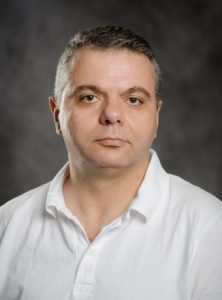
Chemistry’s own Dr. Christo Z. Christov will be our seminar speaker this Friday (October 30th). The virtual seminar will be held via Zoom at 3:00 PM. The passcode is 859189 if needed.
Computational Insight into Catalytic Mechanisms of Non-Heme Fe(II)- and 2-Oxoglutarate-Dependent Oxygenases
Abstract: “Mononuclear non-heme Fe(II) and 2-oxoglutarate (2OG)-dependent enzymes catalyze an incredibly diverse arsenal of chemical reactions with vital biological roles, making them attractive targets for therapeutics and biotechnology developments. Some of the chemical transformations performed by this family of enzymes include hydroxylation, demethylation, desaturation, and cyclization. One of the essential reactions performed by non-heme iron enzymes is histone demethylation. The class of enzymes responsible for histone lysine demethylation is called Histone Lysine Demethylases (KDMs). These enzymes couple decarboxylation of 2OG with substrate oxidation. Important demethylation reactions are catalyzed also by DNA demethylases such as the bacterial AlkB and its human homolog AlkBH2 in single-stranded (ss)- and double-stranded (ds) DNA. Also, an unusual enzymatic transformation performed by the Ethylene-Forming Enzyme (EFE) on its co-substrate (2OG) produces ethylene.”
“In this talk, I will present how applying state-of-the-art computational chemistry methods such as molecular dynamics (MD) and Combined Quantum Mechanical/Molecular Mechanical (QM/MM) we provide a mechanistic insight that cannot be received experimentally. The discussion will focus on: i) the histone demethylases PHF8 (KDM7B) and KDM4A (JMJD2A), which differ in their substrate specificity and domain organization; ii) DNA demethylases AlkB and AlkBH2 that differ in their preference to ss- or ds DNA; and iii) the Ethylene-Forming Enzyme (EFE) that performs a unique transformation of 2OG leading to the production of ethylene. The atomic and molecular orbital interactions along the reaction process within the enzyme environment will be discussed. The studies emphasize the critical importance of the protein environment and dynamics, especially focusing on the second sphere’s interactions and beyond for the catalytic process. The outcomes contribute to a fundamental understanding of enzyme mechanisms and have a long-term impact on enzyme engineering and drug design.”
Bio: Dr. Christo Z. Christov grew up in the town of Sevlievo, Bulgaria. He received MSc in Biochemistry at the University of Sofia, Sofia, and a Ph.D. in Theoretical Chemistry at the Bulgarian Academy of Sciences, Sofia, Bulgaria. Following postdoctoral studies in Spain and the UK, Christo gained a tenured faculty position at the Department of Applied Sciences at Northumbria University, UK in 2010. He was awarded a Fulbright Senior Grant and a Marie Curie International Outgoing Career Development Fellowship for the Department of Chemistry (The Solomon Lab) at Stanford University (2010-2013). Since 2017 Christo is an Associate Professor of Chemistry at the Department of Chemistry at Michigan Technological University, Houghton MI. Christo’s Research interests are in Computational Bioinorganic Chemistry with a focus on non- heme Fe(II) and 2OG-Dependent Oxygenase such as Histone Demethylases and TET enzymes involved in the epigenetic regulation and the Ethylene Forming Enzyme. Currently, Christo’s research is supported by the National Science Foundation of USA.